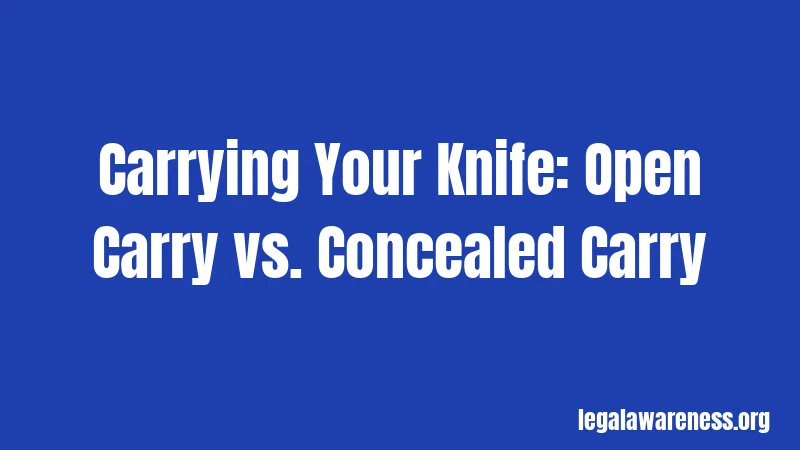Missouri Knife Laws (2026): Surprisingly Permissive But Watch These Details
Most people have no idea how lenient Missouri’s knife laws actually are. Seriously. You can own and carry knives that would be totally illegal in most other states. But here’s the thing—there are still some tricky rules you need to know. Let’s break down exactly what’s legal and what could get you in trouble.
The good news? Missouri respects your right to own bladed tools. The not-so-good news? There are specific situations where carrying a knife will land you in hot water. Understand these rules now, and you’ll stay safe and legal.
What Exactly Is a “Knife” Under Missouri Law?

Okay, this is where it gets a little technical. But trust me, understanding this part matters.
According to Missouri law, a “knife” is any dagger, dirk, stiletto, or bladed hand instrument that can cause serious injury or death by cutting or stabbing. Pretty broad definition, right? It includes a lot of different types of blades.
Here’s the important part though. Missouri creates a special category for ordinary pocket knives. If your folding knife has a blade of four inches or less, it’s NOT legally classified as a “knife” for weapons purposes. This is huge. It means those smaller pocket knives get almost no restrictions.
Any other blade longer than four inches? That’s considered a “knife” under the law. It means different rules apply to how you can carry it.
Basic Missouri Knife Ownership: What You Can Own
Want to know the best part about Missouri knife laws? You can own almost any type of blade. Open carry of almost any knife is permitted. Seriously.
You can legally own switchblade knives in Missouri. Before 2012, this was illegal. The state changed the law to remove switchblades from the prohibited weapons list. That was a big deal for knife enthusiasts.
You can own Bowie knives, butterfly knives, fixed blades, throwing knives, and gravity knives. You can own undetectable knives and oversized blades. Missouri doesn’t have a state law saying “this type of knife is banned.” Pretty great, honestly.
The only real federal limitation applies to switchblades. Federal law restricts transporting switchblades across state lines. But within Missouri? You’re good to own them.
Carrying Your Knife: Open Carry vs. Concealed Carry

Here’s where things get more complicated. Ownership is pretty free. Carrying? That depends on the type of knife and how you carry it.
Open Carrying Knives
This one’s straightforward. You can openly carry basically any knife in Missouri. Dirks, switchblades, Bowies, fixed blades—all legal for open carry. The blade doesn’t have to be hidden. It can be visible to everyone around you.
Concealed Carrying: The Four-Inch Rule
Now, this is where most people get confused.
You can conceal carry an ordinary pocket knife with a blade of four inches or less. No permit required. No restrictions. This is your free pass for small folding knives.
But any knife with a blade longer than four inches? That’s different. You cannot conceal carry it without a special permit. Get caught with a larger knife hidden on your person, and you’ve broken the law.
There’s an exception though. If you have a concealed carry permit, you can carry concealed knives with longer blades in most situations.
Restricted Locations: Where Knives Are Always Off-Limits
Here’s an important one. Even if your knife is legal, there are specific places where you absolutely cannot carry it.
You cannot bring any knife into these locations:
- Any police or sheriff office or station
- Within 25 feet of a polling place on election day
- Inside any school or school building
- Onto school buses
- Any courthouse
- Any government building where firearms are restricted
- Any jail or detention facility
- Inside airports or onto aircraft
Think of these like gun-free zones. If firearms aren’t allowed, your knife isn’t allowed either. This applies even to your small pocket knife.
The restriction applies if you’re carrying the knife concealed. Open carry isn’t specifically mentioned for all of these, but honestly? Don’t test it.
Concealed Carry Permits: Your Pass for Longer Blades

Here’s what you should know. If you get a Missouri concealed carry permit, the rules change.
With a valid concealed carry permit, you can carry concealed knives almost anywhere. This includes blades longer than four inches. The permit essentially exempts you from many of the location restrictions.
To get a concealed carry permit in Missouri, you need to pass a background check and meet basic eligibility requirements. It’s not super difficult, but it does require going through the process.
Many knife enthusiasts get a permit specifically for the freedom it provides. If you carry regularly, it might be worth looking into.
The Whole “Concealed” Thing: How Do Police Define It?
You’re probably wondering: how concealed does the knife have to be? Like, what if just the handle is showing?
Here’s the legal answer. A knife is considered concealed if it’s not “readily and practically visible” to people approaching you under normal circumstances. So if the handle is visible, you might still be breaking the law. It depends on whether it’s easy to recognize as a weapon.
Court cases have ruled that even if part of the knife is visible, if it’s not obviously a weapon, it counts as concealed. And carrying it requires being easy to reach and quick to grab.
The bottom line? If someone sees your blade, you’re probably okay. If someone sees a blade-shaped object and can’t tell what it is? You might get stopped by police.
When Knife Charges Become Serious Crimes
Okay, here’s where things get really serious. Using a knife as a weapon—or carrying it to use as a weapon—adds criminal charges.
If you carry a concealed knife into a restricted location (without a permit), you’re committing unlawful use of a weapon. That’s a Class B misdemeanor. You could face up to six months in jail and fines up to $1,000.
If you carry the knife into a location where firearms are completely banned, it bumps up to a Class B misdemeanor. Same penalties.
But wait, there’s more. If you exhibit a knife in an angry or threatening manner—basically, if you pull it out to threaten someone—that’s a Class E felony. You’re looking at up to four years in prison.
Using a knife to assault or injure someone is way more serious. That can result in Class B or even Class A felony charges. Prison time could be 5 to 30 years or longer.
Not alone in this situation? If someone’s helping you carry illegal weapons, they face the same penalties.
Prior Criminal History: It Gets Worse
Here’s something critical to know. If you have a violent felony on your record, Missouri law prohibits you from carrying weapons. Any weapons. That includes knives.
The same applies if you’ve been legally determined to be mentally infirm or dangerous.
If you have any felony convictions, carrying any concealed knife without a permit is treated more seriously. Repeat offenses earn harsher penalties.
This is one area where you really need to know your own background. Don’t assume old charges don’t matter anymore.
Defending Yourself With a Knife: Missouri’s Self-Defense Laws
Missouri has strong self-defense laws. This includes using knives for protection.
If you use a knife to defend yourself or someone else, you’re generally legally protected. Missouri’s “Stand Your Ground” law and “Castle Doctrine” apply to knife use.
But here’s the catch. Your use of force has to be reasonable. It has to match the level of threat you’re facing. If someone pushes you and you stab them, that’s not reasonable force. If someone is attacking you with a deadly weapon, stabbing in self-defense probably is reasonable.
Also important: you can’t be the initial aggressor. If you start a fight and then pull a knife, you lose your self-defense protections.
The guidance here is simple. Use only as much force as necessary to stop the threat. Anything more is excessive and could lead to assault or murder charges instead.
Local Laws: City Rules Can Be Stricter
Missouri doesn’t have a state preemption law for knives. This means cities and counties can make their own rules.
In practice, most counties follow the state law pretty closely. But some cities have stricter rules. St. Louis, for example, has local ordinances that add extra restrictions.
Before carrying a knife in a major city, check the local laws. What’s legal in rural Missouri might not be legal in Kansas City or St. Louis.
This is frustrating, honestly. But it’s the reality. Just check before you carry.
Federal Knife Laws: When Federal Limits Apply
Remember those switchblades? Missouri law says they’re legal. But federal law has something to say about them too.
The Federal Switchblade Act limits how you can transport automatic knives across state lines. You can’t legally take a switchblade from Missouri to Kansas or Arkansas without specific legal reasons.
If you’re traveling out of state, think twice about packing automatic knives. Transport violations are federal crimes.
This mostly affects switchblades. Regular pocket knives and fixed blades don’t have these federal restrictions.
Special Situations: Hunting, Camping, and Outdoor Use
Great news for outdoor enthusiasts. You can carry pretty much any knife while hunting or camping.
There are no state restrictions on blade length for hunting or survival knives. You can carry fixed blades, large folders, or specialized knives in wilderness areas.
But check specific rules for state parks or national forests. Some protected federal lands have their own restrictions.
Also, respect private property. If you’re hunting on someone else’s land, follow their rules about what weapons they allow.
Getting Charged With a Knife Crime: What Happens Next
So you got caught carrying a knife illegally. What’s your next move?
First, don’t panic. Being charged doesn’t mean you’ll be convicted. Many knife charges have valid defenses.
Second, get a criminal defense attorney right away. Seriously. Don’t wait. These charges can affect employment, housing, and your right to own weapons.
Your attorney can argue several things. Maybe the knife wasn’t actually concealed. Maybe you were in a self-defense situation. Maybe there’s a reason the charge shouldn’t apply to you.
The specific charges matter. A Class B misdemeanor is very different from a felony charge. Your attorney will work to get the best outcome possible.
How to Stay Legal With Your Knife
Want to avoid problems? Here’s what to do.
Know the four-inch rule. Carry a pocket knife under four inches concealed, and you’re almost certainly legal. Bigger blades? Keep them open or get a permit.
Check restricted locations. Don’t carry into police stations, schools, or government buildings. It’s really that simple.
If you travel between states, leave automatic knives at home. Federal law is strict about this.
Respect private property. If a business posts a “no weapons” sign, respect it. Trespassing charges on top of weapon charges? That’s not fun.
Never display or threaten with a knife. Keep it concealed and non-threatening. Even holding it in an angry manner is a felony.
Get a concealed carry permit if you carry regularly. It opens up legal options and gives you peace of mind.
Penalties by Type of Violation
Let me break down what different charges actually mean:
Class B Misdemeanor: Concealing a knife in a restricted location without a permit. Up to six months in jail, fines to $1,000.
Class E Felony: Threatening someone with a knife, or carrying a knife into a school. Up to four years in prison, fines to $10,000.
Class B Felony: Using a knife to injure someone during a crime. 5 to 15 years in prison.
Class A Felony: Using a knife to cause serious injury or death. 10 to 30 years, possibly life.
These are worst-case scenarios. Many violations are reduced or dismissed. But these are the maximum penalties.
Frequently Asked Questions
Can I carry a concealed pocket knife without a permit in Missouri?
Yes, if the blade is four inches or less. Longer blades require a concealed carry permit or must be openly carried.
Is it legal to own a switchblade in Missouri?
Yes, completely legal. Missouri removed the switchblade ban in 2012. But federal law restricts transporting them across state lines.
What happens if I carry a knife into a school?
That’s a Class E felony. You could face up to four years in prison. Schools are absolutely off-limits.
Do I need a permit to open carry a knife?
No. Missouri allows open carry of almost any knife without a permit.
What defines “concealed” in Missouri law?
A knife is concealed if it’s not readily visible under normal circumstances. Even a partially visible handle might count as concealed if it’s not obviously a weapon.
Can I legally use a knife for self-defense?
Yes, if your use of force is reasonable and proportional to the threat. You can’t be the initial aggressor.
Are there age restrictions on carrying knives?
Missouri doesn’t have specific age limits for knife ownership or carry. But school rules and local ordinances may apply.
What if I have a prior felony conviction?
Prior felony convictions prohibit you from carrying weapons, including knives. Talk to your attorney about your specific situation.
Final Thoughts
Missouri has genuinely permissive knife laws. You can own almost any blade you want. Open carry is almost always allowed. These are real advantages compared to other states.
But the concealed carry rules matter. The restricted locations matter. Federal laws about switchblades matter. And if you ever use a knife as a weapon, things get serious very quickly.
The key takeaway? Know your four-inch rule. Respect the restricted locations. Keep things legal. And if you’re ever charged or unsure, talk to a lawyer.
Stay informed, stay safe, and enjoy your legal right to carry knives responsibly in Missouri.
References
Missouri Revised Statutes § 571.010 – Definitions
Missouri Revised Statutes § 571.030 – Unlawful Use of Weapons
Missouri Revised Statutes § 571.107 – Areas Where Firearms Are Restricted
